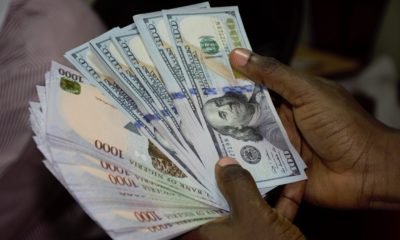- Naira Faces Pressure on Rising Dollar Demand, Outflows
The combination of tightening global financing conditions, which has resulted to capital outflows in the country, the elevated global risk aversion, 2019 election uncertainties and high services payments are likely to put pressure on the naira going into next year.
Analysts at CSL Stockbrokers Limited and the Financial Derivatives Company Limited (FDC), who stated this in two separate reports, argued that capital repatriation by foreign investors was also expected to heighten dollar demand.
While on the parallel market, the naira trades relatively stable at N361 per dollar – N362 per dollar, currency pressures are building at the Investors’ and Exporters’ foreign exchange (I&E) window, where transactions are now being executed at an average rate of N364 per dollar, compared to N362 per dollar-N363 per dollar in previous months.
But the Central Bank of Nigeria (CBN) had insisted that it has enough war chest to meet forex demand in the country.
To the CSL, Nigeria’s periodic currency crises are mainly due to policy makers’ inability to deal with the macroeconomic phenomena called the “impossible Trinity.”
It said, “The impossible trinity (also known as the trilemma) postulates that it is impossible to have all three of the following at the same time: a fixed foreign exchange rate, free movement of capital (absence of capital controls) and an independent monetary policy.
“We think pressure will appear in the foreign exchange market and a parallel market premium in the range of 10-20 per cent will return. Given this view, we recommend that local fixed income investors shorten duration and remain focused on the short-end of the curve.”
While the report noted that the introduction of the I&E FX Window in April 2017, showed the CBN’s effort in liberalising the foreign exchange market, it pointed out that a free floating exchange rate was yet to be accepted in the country.
It added, “Meanwhile, the CBN still has considerable level of control over interest rates. These policy inconsistencies have been in place since independence with its attendant impact evident in the nation’s periodic currency crisis. Nigeria runs a substantial deficit of $5-6 billion on the services balance, however this is usually offset by surplus from the trade account meaning that Nigeria runs a current account surplus.
“We believe CBN will seek to avoid changes to the official exchange rate and will be prepared to see the parallel market premium widen. Looser fiscal policy in the run-up to the election is likely to increase demand for foreign exchange as demand for imports increases, and some of the funds inevitably will be misappropriated.
“We expect demand for foreign exchange to rise significantly beyond the CBN’s willingness to provide it. This will lead to a widening of the parallel market premium as private sector entities with service payments (mostly, interest and dividends) to make have to scramble for foreign exchange.”
On its part, the FDC, a research and financial advisory company anticipated, “increased forex demand in the next couple of months as manufacturers commence inventory build-up for festive sales. This, in addition to increased election spending, could result in exchange rate depreciation. However, the CBN has iterated its preference for exchange rate stability over buoyant external reserves. Hence, we expect the currency to remain relatively stable in 2018.”
The report pointed out that the depletion of Nigeria’s external reserves was expected to be sustained in subsequent months,” owing to forex demand pressures arising from election and festive spending.”
In addition, the firm predicted one more hike in the US Federal Reserves’ (the Fed) interest rate in 2018. This it stated would further intensify capital outflows, heightening pressures on the exchange rate.
However, higher oil proceeds could slow down the pace of depletion, it noted.




 Naira4 weeks ago
Naira4 weeks ago






 Naira4 weeks ago
Naira4 weeks ago


 Travel3 weeks ago
Travel3 weeks ago


 Jobs4 weeks ago
Jobs4 weeks ago
 Naira3 weeks ago
Naira3 weeks ago
 Naira3 weeks ago
Naira3 weeks ago
 Investment4 weeks ago
Investment4 weeks ago
 Travel4 weeks ago
Travel4 weeks ago












